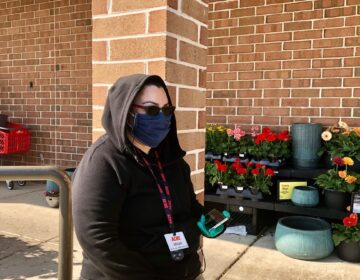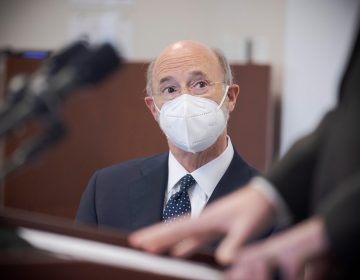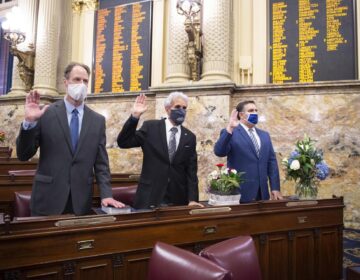Pa. moderates find themselves straddling a widening rift over COVID-19 responses
After a short burst of bipartisan unity over COVID-19, Pa. moderates say their fellow politicians are dividing again.

Republican U.S. Rep Brian Fitzpatrick (left), representing Pennsylvania's 1st District and Democratic U.S. Rep. Susan Wild (right), representing Pennsylvania's 7th District. (AP file photos)
Are you on the front lines of the coronavirus? Help us report on the pandemic.
Gene DiGirolamo, a former GOP state representative and now Bucks County commissioner, doesn’t remember exactly when he felt the political dialogue over COVID-19 turn partisan.
“I think initially, everybody was trying to work together, both sides of the aisle, House and the Senate with the governor,” he said. “Especially with some of the bills that are coming out of the House…it looks like now there has been more than a little disagreement on how fast to proceed.”
It’s a characteristically careful — if critical — assessment from DiGirolamo, who during his time in Harrisburg was seen as a consummate moderate — a kind of politician that used to be relatively common in Pennsylvania, but has grown rarer as the states’ parties have diverged ideologically over the past few decades.
In divided legislative bodies, middle-of-the-road members can serve as intermediaries and tiebreakers. They’re not always successful, as DiGirolamo learned, for instance, during several failed attempts to convince his GOP colleagues to tax Pennsylvania’s natural gas industry.
But it’s a role that some moderates, like U.S. Rep. Susan Wild, a Democrat representing the Lehigh Valley, think is especially important, if increasingly difficult, in the effort to respond to the coronavirus.
Wild said that like the state House, Congress moved “as quickly as I’ve ever seen anything happen” in the early days after the pandemic took root across the country.
She personally co-sponsored two bills that made it into the CARES package that President Donald Trump signed into law. The first aims to make sure seniors and people with disabilities get meal service delivery, by letting states take funding for meals in group settings to be used for delivery, like Meals on Wheels. Among other things, the second lets people get home health care for routine medical issues without a physician’s order.
Wild also said she had sit-down sessions with Democratic Gov. Tom Wolf to urge him, for instance, to allow elective surgeries to resume in some parts of Pennsylvania.
Major health systems like UPMC in Pittsburgh were also pushing for such a change, and Wolf ultimately relented. State Health Secretary Rachel Levine announced Monday that her department was changing its guidance on those procedures, and allowing them so long as hospitals had the staff and equipment to accommodate them comfortably.
But Wild added that lately, she has had less success in her attempts to cajole Republicans. A letter that she coordinated and sent to U.S. House leaders urging a cap on prices for prescription drugs was co-signed by 56 other members, but none from the GOP.
Wild said she’d been careful in drafting her request — she included no sweeping changes that would have effects beyond the pandemic, noting that “it wasn’t as though I was trying to do a massive HR-3 [a sweeping drug-pricing bill] end-run or anything like that. It was literally to cap those prescription drug prices during this COVID time, and it was a limited group of drugs.”
“Couldn’t get a single Republican in it,” she said. “Just blew me away that we couldn’t.”
One of the more moderate Republicans in Pennsylvania’s congressional delegation, U.S. Rep. Brian Fitzpatrick from Bucks County, broke somewhat with his party over funding the Paycheck Protection Program, arguing — as many Democrats were contending— that safeguards needed to be in place so the money actually went to struggling small businesses, not hedge funds and larger companies. Congress eventually authorized new PPP funding with additional restrictions.
Asked to elaborate on his feelings about lawmakers’ success in balancing another contentious issue — how fast to reopen businesses — a spokesperson for Fitzpatrick declined to offer much detail.
“With regard to how the various levels of government have responded, the Congressman believes that now is the time for everyone to come together to get through this health and economic crisis,” spokesperson Will Kiley wrote in an email. “Now is not the time to criticize, it is a time for everyone to do their part to bring our community together to beat this pandemic.”
Kiley also avoided weighing in on Fitzpatrick’s sentiment on the president’s response to the pandemic. But while elected Republicans across the political spectrum have been relatively united in their support for — or at least, lack of criticism of — Trump, former Pa. Congressman Charlie Dent has no such qualms.
Dent used to represent the district that Wild now holds — though redistricting in 2018 shifted its contours and changed its number.
He said he’s been pretty satisfied with the actions Congress and the president have taken so far, but he’s worried the president’s frequent press conferences hurt more than they help.
Trump, he said, “needs to speak less.”
“I think the president has used his pulpit in too many cases to attack people who may have criticized [him],” Dent said. “I mean that’s unnecessary…I don’t think the American public wants to hear that right now, they want to simply get the information.”
Dent encouraged his former House colleagues to take a similar tact to Wild’s — don’t try to change policy beyond the pandemic.
“At a time like this, you’re going to do things that you would ordinarily never do,” he said. “But confine your time and attention and your focus to COVID-related issues that are of an immediate nature.”
Back on the state level, County Commissioner DiGirolamo has been paying close attention to his former state House colleagues’ work to see how it’ll affect his Bucks County constituents. He said he is still hoping the GOP-controlled legislature can find a way to work with the governor.
He said some of the Republicans’ recent attempts to loosen stay-at-home restrictions across the state are overly broad, and therefore a waste of political capital. He also thinks certain moves by the Wolf administration — closing golf courses and liquor stores, not offering more details about who has been getting business closure waivers — were missteps, albeit ones Wolf is gradually walking back.
Ultimately though, he prefers to “err on the side of keeping our people safe and not going too quickly.”
“I think the worst thing that we can do is to open up too quickly when it appears that we’ve got a handle on this virus, and for this thing to come back and get bad again,” DiGirolamo said.
WHYY is your source for fact-based, in-depth journalism and information. As a nonprofit organization, we rely on financial support from readers like you. Please give today.




![CoronavirusPandemic_1024x512[1]](https://whyy.org/wp-content/uploads/2020/03/CoronavirusPandemic_1024x5121-300x150.jpg)


